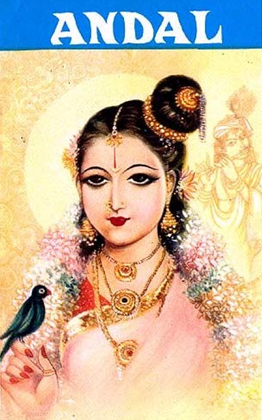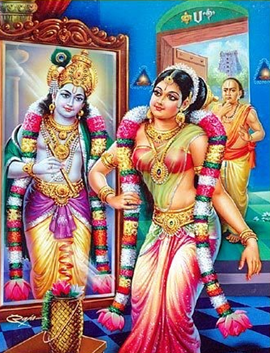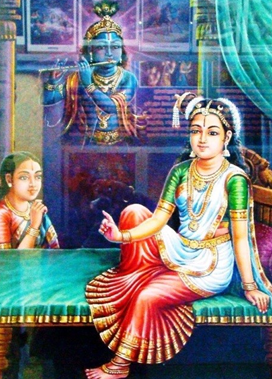Talk:The Āḻvār Saints:Āṇḍāl
By Vishal Agarwal
Āṇḍāḷ lived in the 8th century CE. Along with Nammāḷvār, she is considered the most important of the twelve Alvārs. No one knows who her biological parents were. Śrī Viṣṇucitta, a pious bhakta of Vishnu, found her one day in a bush of Tulsi plant (sacred to Vishnu) in his garden. He adopted the baby girl as his own daughter, and named her Godai (“gift of Mother Earth”). Viṣṇucitta himself is regarded as one of the twelve Alvārs and is known as Periyāḷvār.
Viṣṇucitta lived in the city of Srivilliputtur, where he had the duty of delivering flower garlands to Vishnu’s temple every day. Āṇḍāḷ grew up in holy surroundings, worshipping Vishnu and listening to holy discourses, Vedas, epics, bhajans, and kīrtanas. From childhood onwards she listened to the līlās (divine plays) of Krishna with rapt attention and developed a deep love for the Bhagavān. By her virtuous behaviour, Godai became dear to her father and friends, and the neighbours gave her the name Āṇḍāḷ (“Ruler”).
When Godai grew up, she began making garlands for her beloved Bhagavān and sent them through her father. She secretly wore the garlands meant for the Bhagavān before sending them. One day, her father discovered this and went to the temple empty-handed to apologise to the Bhagavān for his daughter’s behaviour. That night, Vishnu appeared to him in a dream and said, “Periyāḷvār, the garland worn by your daughter has the sweet fragrance of her devotion and purity; that is the garland I love.”
Viṣṇucitta realised the divine love between the Bhagavān and his daughter. Āṇḍāḷ declared that she would marry none other than Krishna. As years passed, her devotion grew deeper. She imagined that Srivilliputtur was Gokul, where Krishna had spent his childhood, and that her friends were gopīs. One year, during the month of Mārgaḻi (December–January), she observed a 30-day vow. Each day she dressed herself as a bride and sang a new song in praise of Vishnu.
Vishnu appeared in a dream to her father and said, “When the month of Mārgaḻi is over, I want you to dress your daughter as a bride and bring her to me in the temple.” Periyāḷvār obeyed and took her in a wedding procession to the Vishnu mandir. When Āṇḍāḷ reached the temple, she transformed into a pillar of light and merged with Bhagavān Vishnu.
Āṇḍāḷ composed two works in her short life:
- Tiruppāvai – a poem of thirty verses in which Āṇḍāḷ imagines herself to be a cowherd girl and sings hymns about Bhagavān Krishna.
- Nācciyār Tirumoḻi – a poem of 143 verses. Tirumoḻi, meaning “sacred sayings,” is a Tamil poetic style.
Āṇḍāḷ is now one of the most loved poet-saints of South India. She is present in many Vaishnava temples in India and abroad, always depicted next to her Bhagavān as she desired. Regarded as a gift of Mother Earth, she is also considered an incarnation of Bhūdevī (Mother Earth). During Mārgaḻi, discourses on the Tiruppāvai are held across India in Tamil, Telugu, Kannada, Hindi, and English. A temple at her birthplace in Srivilliputtur attracts large numbers of devotees every year.




